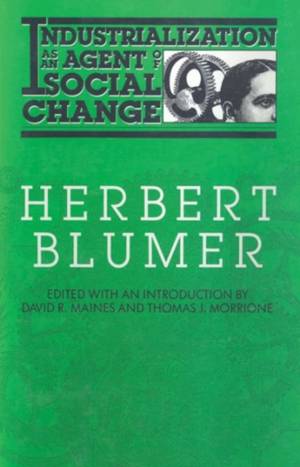
- Afhalen na 1 uur in een winkel met voorraad
- Gratis thuislevering in België vanaf € 30
- Ruim aanbod met 7 miljoen producten
- Afhalen na 1 uur in een winkel met voorraad
- Gratis thuislevering in België vanaf € 30
- Ruim aanbod met 7 miljoen producten
Omschrijving
Herbert Blumer wrote continuously and voluminously, and consequently left a vast array of unpublished work at the time of his death in 1987. This posthumously published volume testifies further to his perceptive analysis of large-scale social organizations and elegant application of symbolic interactionist principles.
Blumer's focus on the processual nature of social life and on the significance of the communicative interpretation of social contexts is manifest in his theory of industrialization and social change. His theory entails three major points: industrialization must be seen in processual terms, and the industrialization process is different for different historical periods; the consequences of industrialization are a function of the interpretive nature of human action and resembles a neutral framework within which groups interpret the meaning of industrial relations, and the industrial sector must be viewed in terms of power relations; industrial societies contain inherently conflicting interests.
The editors' introductory essay outlines Blumer's metatheoretical stance (symbolic interactionism) and its emphasis on the adjustive character of social life. It places Blumer's theory in the context of contemporary macro theory, including world systems theory, resource dependence theory, and modernization theory.
Specificaties
Betrokkenen
- Auteur(s):
- Uitgeverij:
Inhoud
- Aantal bladzijden:
- 196
- Taal:
- Engels
- Reeks:
Eigenschappen
- Productcode (EAN):
- 9780202304113
- Verschijningsdatum:
- 31/12/1990
- Uitvoering:
- Paperback
- Formaat:
- Trade paperback (VS)
- Afmetingen:
- 153 mm x 229 mm
- Gewicht:
- 340 g

Alleen bij Standaard Boekhandel
Beoordelingen
We publiceren alleen reviews die voldoen aan de voorwaarden voor reviews. Bekijk onze voorwaarden voor reviews.











